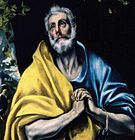
| Part of a series of articles on |
| Peter in the Bible |
|---|
 |
| In the New Testament |
| Other |
In Christianity, the Confession of Peter (translated from the Matthean Vulgate Latin section title: Confessio Petri) refers to an episode in the New Testament in which the Apostle Peter proclaims Jesus to be the Christ (Jewish Messiah). The proclamation is described in the three Synoptic Gospels: Matthew 16:13–20, Mark 8:27–30 and Luke 9:18–21.[1][2] Depending on which gospel one reads, Peter either says: 'You are the Messiah' or 'the Christ' (Mark 8:29); or 'You are the Messiah, the Son of the living God',[1] (Matthew 16:16), or 'God's Messiah' or 'The Christ of God' (Luke 9:20).[3]
The proclamation of Jesus as Christ is fundamental to Christology; the Confession of Peter and Jesus' acceptance of the title "Messiah" form a definitive statement in the New Testament narrative regarding the person of Jesus Christ.[4][5] In this New Testament narrative, Jesus not only accepts the titles Christ and Son of God, but declares the proclamation a divine revelation by stating that his Father in Heaven had revealed it to Peter, unequivocally declaring himself to be both Christ and the Son of God.[5]
In the same passage Jesus also selects Peter as the leader of the Apostles, and states: "Upon this rock I will build my church." Most Christian denominations agree that the statement applies to Peter, but they diverge on their interpretations of what happens after Peter.[6]
The Confession of Peter is also the name of a liturgical feastday celebrated by several Christian churches, often as part of the Week of Prayer for Christian Unity.[7][8]
- ^ a b c Who do you say that I am? Essays on Christology by Jack Dean Kingsbury, Mark Allan Powell, David R. Bauer 1999 ISBN 0-664-25752-6 page xvi
- ^ The Collegeville Bible Commentary: New Testament by Robert J. Karris 1992 ISBN 0-8146-2211-9 pages 885-886
- ^ Note that some translations add a few words to Luke's version, namely 'You are' and 'sent from [God]' or 'whom [God] has sent'. Similar to the other gospels, some translations render Χριστὸν as 'Anointed One' rather than 'the Christ' or 'the Messiah'. "Luke 9:20". Biblehub.com. 2011. Retrieved 8 January 2021.
- ^ Cite error: The named reference
Rudolf7was invoked but never defined (see the help page). - ^ a b Cite error: The named reference
Yuehwas invoked but never defined (see the help page). - ^ Cite error: The named reference
Boring69was invoked but never defined (see the help page). - ^ Pocket Dictionary of Liturgy & Worship by Brett Scott Provance 2009 ISBN 978-0-8308-2707-7 page 59
- ^ Exciting Holiness: Collects and Readings for the Festivals by B. Tristam ISBN 1-85311-479-0 Canterbury Press 2003 pages 54-55